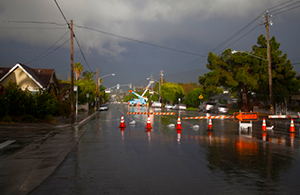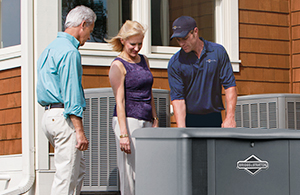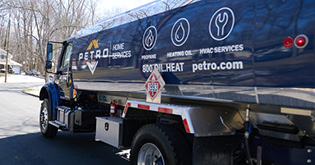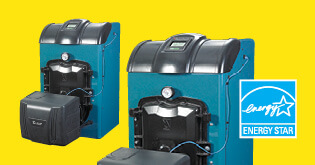- My Account:
- Sign In
- Register
- Make Payment
Articles.
Below are the categories for any articles that are published on our website. You can find articles on topics ranging from heating oil, propane, heating equipment, cooling, and much, much more. Our Home section also contains important tips, insightful facts and helpful how-to guides on lots of topics about everything from energy efficiency to important safety tips for taking care of your home and family. We also update our Featured Articles section with our newest and most relevant seasonal content to help you with your home services throughout the year. Check them out below...
Featured articles.
The ultimate generator guide: types, choosing the right one, installation, cost and more.

Why do I need a generator?
The power goes out. Food in the fridge will start to spoil and your cell phone will not charge overnight. Imagine sleeping past your alarm and being late for work or getting ready for work in the freezing cold without lights. It could also mean costly repairs to your home when the sump pump leaks or the pipes freeze.
Generators help prevent all of these issues. Standby backup generators keep the power going when the power goes out, and a proper backup generator will undoubtedly pay for itself. In 2018, the United States Energy Information Administration found on average that every American lost power at least once a year.
This means that it is only a matter of time before you lose power in your own home, and why purchasing a standby generator could be the one investment that you will never regret when the lights go out.
Learn more important facts explaining why every homeowner needs a standby generator
What is a generator?
A generator is a portable or stationary backup electricity source. Most often they can be used on command or set up to automatically turn on when the power goes off. They range in wattage and can be small enough for camping or large enough for an entire home or commercial property.
Since you know that you could lose power at some point, having a backup generator is sure to be useful. And, with proper maintenance from an experienced technician, it will certainly be useful many times throughout your life.
What is the best generator?
The one that works best for your home size, power configuration, and a cost that fits your budget.While every home should have a backup generator, there are many types to choose from and generator cost is influenced by many factors.
In the meantime, the following features helpful information to learn more about generator installation, generator fuel types and more.
What types of generators are available?
There are many types of generators, and the right one for your home is best determined by a certified professional. This is to ensure that you choose the right type and size of generator for your home.But before installing a generator, it is helpful to know the differences between each kind. They differ in fuel type, purpose, and cost. You will also want to pay attention to power ratings, as smaller and larger homes can use generators with different ratings.
How you will need power is another factor. Are you just going camping? If so, then a small portable generator will do.
But, if you need to maintain the power for home appliances, televisions, refrigerators, and more, then a larger standby generator is required.

Types of generators.
Generator types fall within three categories, each of which serves a different purpose.
Portable generator – these generators are often small and can be transported for use in travel and work. Often these generators will have outlets directly on them to plug-in required devices and appliances. Portable generators are powered by combustion engines fueled two different ways:
- Propane generators – fueled by liquid propane gas
- Diesel generators – portable generators fueled by diesel gas
- Gas generators – fueled by liquid natural gasoline
Portable generators can still be connected to your home power system, just in case. This requires the Installation of a transfer switch on your home.
Inverter generator – these generators are cleaner, quieter types with highly-reactive alternators. This allows the generator to only produce the power that is needed at any given moment and to conserve fuel.
Gas-powered inverter generators are also significantly lighter in weight than other models, making them attractive for those who need power on the go.
Standby generator – these generators are what homeowners use to consistently backup their power. Whole-house generators are often the most reliable but also the most expensive options.
Standby generators are natural gas or propane powered and are connected to the natural gas lines of your home.
Choosing a generator for your home.
The right generator for your home is suited to the size of your house and your budget.
Small to medium-sized homes range anywhere from 500 to 3,500 square feet of floor space. These home sizes are well served by a 12kW standby generator.
Larger homes have anywhere between 3,500 and 7,000 feet of floor space. In this case, an 20kW standby generator would work well for you. In most large houses, you will need more than 15,000-18,000 watts of power.
Generator maintenance and repair.
A generator requires repairs and maintenance throughout its life to ensure that you take full advantage of service warranties. At Petro Home Services, we offer a 10-year home service warranty on all our generators to make sure you keep the lights on 24/7, in any weather.
The most common reasons for generator repair include:
- Leaks in oil or coolant
- Faulty block heaters
- Low coolant/high temperature
Trained professionals are the only people who should handle the repair and maintenance of generators. While people might think repairing a generator could be their next DIY project, there are far too many components and precautions to understand or teach yourself.
Annual maintenance check-ups will ensure your generator lasts through the entirety of its useful life. And, if you ever run into a problem throughout the year, the experts at Petro are available any time you need us.
Where to go for generator services?
Ultimately, there is nothing more vital during a power outage than an expertly installed and sized backup generator. From saving groceries in the fridge to keeping the pipes from freezing – and everything in between – getting started on backing up your home’s power supply needs to start as soon as possible.
And no one does it better than your local experts at Petro Home Services. Our highly trained and experienced generator installation technicians have dealt with all sizes and types of homes. Plus, with the best standby generators on the market at our disposal, we have the backup power solutions that work.
For a free consultation on your backup generator needs, contact Petro Home Services today at 888.735.5651.






